Last Sunday, 15 March 2020, vivacious French actress and singer Suzy Delair (1917-2020) passed away. She starred in many different films and was also famous in France as a singer of songs like 'Avec son Tra-la-la'. For several years, the saucy star was the companion of film director Henri-Georges Clouzot, in whose films of the 1940s she appeared, including the masterpiece Quai des Orfèvres/Quay of the Goldsmiths (1947). La Delair was 102.
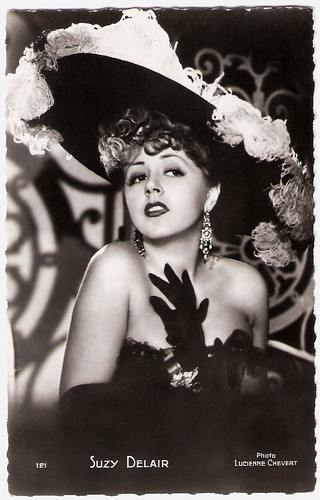
French postcard by Editions P.I., offered by Les Carbones Korès, no. 121. Photo: Lucienne Chevert. Publicity still for Quai des Orfèvres (Henri-Georges Clouzot, 1947).

French postcard by Editions O.P., no. 4. Photo: Studio Harcourt.
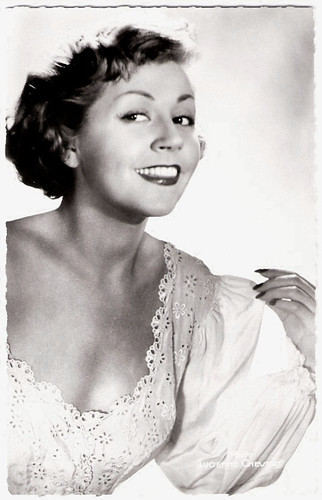
French postcard by Editions du Globe, Paris, no. 128. Photo: Lucienne Chevert.
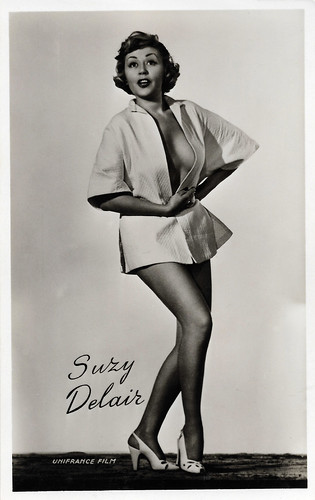
Dutch postcard, no. AX 850. Photo: Unifrance Film.
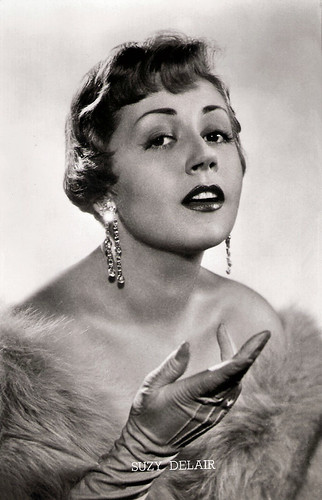
French postcard offered by Korès 'Carboplane', no. 153.
Suzanne Pierrette Delaire was born in 1917, in Paris as the daughter of a seamstress and a saddle shop owner. Her first job was as an apprentice for milliner Suzanne Talbot, but Delaire dreamed of the theatre. As a teenager, she started playing bit parts in films and on stage.
Her film debut was Un caprice de la Pompadour/Madame Pompadour (Willy Wolff, Joë Hamman, 1930). She had her first success in the music-halls and appeared in the cabaret of Suzy Solidor and the revue of Mistinquett. During the 1930s, she played small parts in films like La Dame de chez Maxim's (Alexander Korda, 1932) based on the play by farceur Georges Feydeau, Poliche (Abel Gance, 1934) with Marie Bell, and Prends la route/Hit the Road (Jean Boyer, 1936).
Finally, her breakthrough in the cinema came with Le Dernier des six/The Last One of the Six (Georges Lacombe, 1941). In this mystery thriller, she played cabaret singer Mila Malou, the unbearable girlfriend of the protagonist, inspector Wens (Pierre Fresnay). The film was based on a script by Henri-Georges Clouzot, with whom Suzy Delair was living together.
In 2003, the 85-year-old Delair told the New York Times about Clouzot: "He met me when I was a little debutante, working with Mistinquett. He adored Mistinquett, and he came to one of her shows, where I was singing one of her great successes, Valencia. And he put a cross next to my name. The next time he came to the show, he waited for me at the exit, and we went for a drink. And that lasted for 12 years." When Clouzot became a director, he offered her two other big successes. First, she returned in the popular sequel to Le Dernier des six, L'assassin habite au 21/The Murderer Lives at Number 21 (Henri-Georges Clouzot, 1942).
Then followed Quai des Orfèvres/Quay of the Goldsmiths (Henri-Georges Clouzot, 1947), which made him the 'French Alfred Hitchcock'. In this classic thriller, Delair played the frivolous music-hall singer Jenny L'Amour who is prepared to do anything to become famous and makes thus her poor husband (Bernard Blier) insanely jealous. With this great part, she emerged to international stardom. At IMDb, Guy Bellinger describes her as the 'prototype of the sexy cheeky French lady'. She was a seductive, stunningly attractive actress with a natural acting style. Sadly, Delair and Clouzot separated and after their successes together, the rest of her film career seems a bit disappointing. However, there are some exceptions.
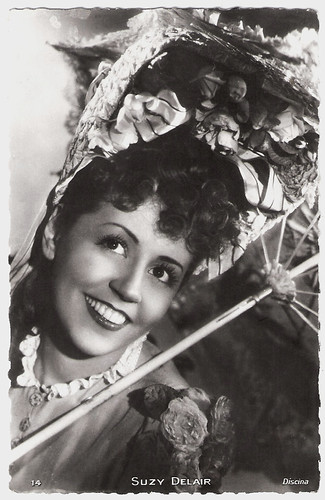
French postcard, no. 14. Photo: Discina.
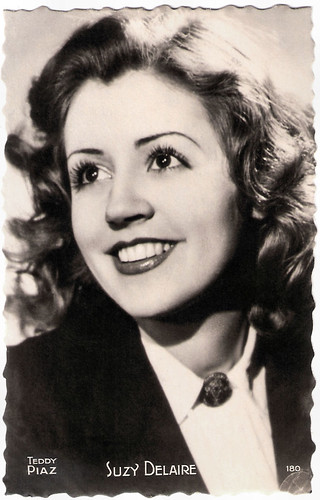
French postcard by Editions O.P., no. 180. Photo: Teddy Piaz.
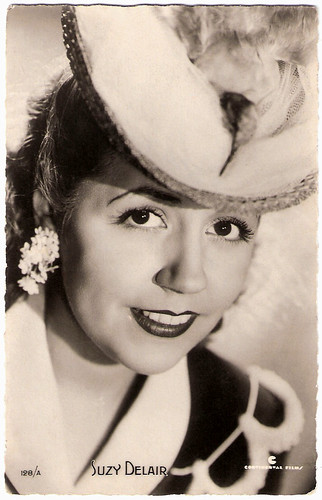
French postcard by Editions Continental, no. 128/A. Photo: Continental Films.
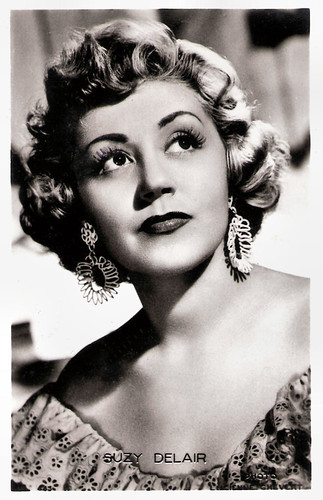
French postcard offered by Editions P.I., no. 13 F. Photo: Lucienne Chevert.

French postcard by Editions P.I., Paris, no. 29 H. P.I. was the French license holder for Universum-Film A.G. (UFA), Berlin-Tempelhof. Photo: Lucienne Chevert.
After the war, Suzy Delair starred in films by major directors like Marcel L'Herbier (La Vie de bohème, 1945), Jean Dréville (Copie conforme/Confessions of a Rogue, 1947), Marcel Carné (Du mouron pour les petits oiseaux/Chicken Feed for Little Birds, 1962), and René Clément (Paris brûle-t-il?/Is Paris Burning?, 1966).
A highlight in her career and a milestone in the history of the cinema was Rocco e i suoi fratelli/Rocco and His Brothers (Luchino Visconti, 1960) starring Alain Delon and Renato Salvatori, even if her part in this operatic masterpiece is a minor one.
Delair covered all registers - from drama to comedy. Ironically, Suzy is probably best known to American filmgoers for what may well be her worst film. In 1950, she appeared as will-of-the-wisp chanteuse Cheri Lamour in the last comedy of the ageing Laurel & Hardy, the melancholy Atoll K/Utopia (Léo Joannon, 1951).
She also appeared in the Fernandel vehicle Le Couturier de ces Dames/Fernandel the Dress Maker (Jean Boyer, 1956) and in the hilarious farce Les Aventures de Rabbi Jacob/The Mad Adventures of Rabbi Jacob (Gérard Oury, 1973) starring French comedy star Louis de Funès. She was a dancer and a singer, and her chanson 'Avec son Tra-la-la' is an evergreen in France. She introduced it in Quai des Orfèvres (1947). Delair also appeared in several operettas by Jacques Offenbach and Oscar and Johan Strauss.
Her last film was Oublie-moi, Mandoline/Forget Me, Mandoline (Michel Wyn, 1976). Since then Suzy Delair only appeared incidentally on television. Guy Bellinger gives an interesting answer to why Delair was not more famous than she was: "Suzy Delair could hardly choose between her two careers. This may be the reason why she missed out on more great roles than she finally interpreted. Nevertheless, Mila Malou and Jenny Lamour are now part of the French film heritage. Not everybody can boast having left such an imprint on several generations of movie-goers."
Trailer for Quai des Orfèvres (1947). Source: YouTube Movies (YouTube).
Snippet from Atoll K/Utopia (1951). Source: httpdbetreeorg (YouTube).
Suzy Delair sings Moulin rouge in 1966. Source: Ina Chansons (YouTube).
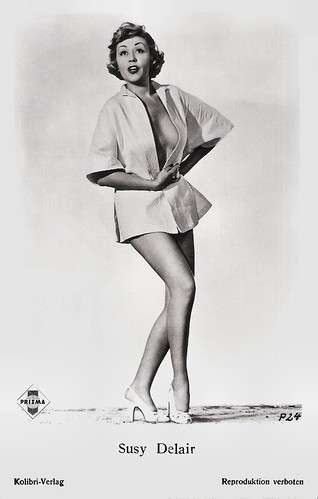
German postcard by Kolibri-Verlag, no. P 24. Photo: Prisma.
Sources: Guy Bellinger (IMDb), Hal Erickson (AllMovie), Movie Diva, Wikipedia (English and French), and IMDb.
This post was last updated on 12 December 2023.

French postcard by Editions P.I., offered by Les Carbones Korès, no. 121. Photo: Lucienne Chevert. Publicity still for Quai des Orfèvres (Henri-Georges Clouzot, 1947).

French postcard by Editions O.P., no. 4. Photo: Studio Harcourt.

French postcard by Editions du Globe, Paris, no. 128. Photo: Lucienne Chevert.

Dutch postcard, no. AX 850. Photo: Unifrance Film.

French postcard offered by Korès 'Carboplane', no. 153.
The prototype of the sexy cheeky French lady
Suzanne Pierrette Delaire was born in 1917, in Paris as the daughter of a seamstress and a saddle shop owner. Her first job was as an apprentice for milliner Suzanne Talbot, but Delaire dreamed of the theatre. As a teenager, she started playing bit parts in films and on stage.
Her film debut was Un caprice de la Pompadour/Madame Pompadour (Willy Wolff, Joë Hamman, 1930). She had her first success in the music-halls and appeared in the cabaret of Suzy Solidor and the revue of Mistinquett. During the 1930s, she played small parts in films like La Dame de chez Maxim's (Alexander Korda, 1932) based on the play by farceur Georges Feydeau, Poliche (Abel Gance, 1934) with Marie Bell, and Prends la route/Hit the Road (Jean Boyer, 1936).
Finally, her breakthrough in the cinema came with Le Dernier des six/The Last One of the Six (Georges Lacombe, 1941). In this mystery thriller, she played cabaret singer Mila Malou, the unbearable girlfriend of the protagonist, inspector Wens (Pierre Fresnay). The film was based on a script by Henri-Georges Clouzot, with whom Suzy Delair was living together.
In 2003, the 85-year-old Delair told the New York Times about Clouzot: "He met me when I was a little debutante, working with Mistinquett. He adored Mistinquett, and he came to one of her shows, where I was singing one of her great successes, Valencia. And he put a cross next to my name. The next time he came to the show, he waited for me at the exit, and we went for a drink. And that lasted for 12 years." When Clouzot became a director, he offered her two other big successes. First, she returned in the popular sequel to Le Dernier des six, L'assassin habite au 21/The Murderer Lives at Number 21 (Henri-Georges Clouzot, 1942).
Then followed Quai des Orfèvres/Quay of the Goldsmiths (Henri-Georges Clouzot, 1947), which made him the 'French Alfred Hitchcock'. In this classic thriller, Delair played the frivolous music-hall singer Jenny L'Amour who is prepared to do anything to become famous and makes thus her poor husband (Bernard Blier) insanely jealous. With this great part, she emerged to international stardom. At IMDb, Guy Bellinger describes her as the 'prototype of the sexy cheeky French lady'. She was a seductive, stunningly attractive actress with a natural acting style. Sadly, Delair and Clouzot separated and after their successes together, the rest of her film career seems a bit disappointing. However, there are some exceptions.

French postcard, no. 14. Photo: Discina.

French postcard by Editions O.P., no. 180. Photo: Teddy Piaz.

French postcard by Editions Continental, no. 128/A. Photo: Continental Films.

French postcard offered by Editions P.I., no. 13 F. Photo: Lucienne Chevert.

French postcard by Editions P.I., Paris, no. 29 H. P.I. was the French license holder for Universum-Film A.G. (UFA), Berlin-Tempelhof. Photo: Lucienne Chevert.
Avec son Tra-la-la
After the war, Suzy Delair starred in films by major directors like Marcel L'Herbier (La Vie de bohème, 1945), Jean Dréville (Copie conforme/Confessions of a Rogue, 1947), Marcel Carné (Du mouron pour les petits oiseaux/Chicken Feed for Little Birds, 1962), and René Clément (Paris brûle-t-il?/Is Paris Burning?, 1966).
A highlight in her career and a milestone in the history of the cinema was Rocco e i suoi fratelli/Rocco and His Brothers (Luchino Visconti, 1960) starring Alain Delon and Renato Salvatori, even if her part in this operatic masterpiece is a minor one.
Delair covered all registers - from drama to comedy. Ironically, Suzy is probably best known to American filmgoers for what may well be her worst film. In 1950, she appeared as will-of-the-wisp chanteuse Cheri Lamour in the last comedy of the ageing Laurel & Hardy, the melancholy Atoll K/Utopia (Léo Joannon, 1951).
She also appeared in the Fernandel vehicle Le Couturier de ces Dames/Fernandel the Dress Maker (Jean Boyer, 1956) and in the hilarious farce Les Aventures de Rabbi Jacob/The Mad Adventures of Rabbi Jacob (Gérard Oury, 1973) starring French comedy star Louis de Funès. She was a dancer and a singer, and her chanson 'Avec son Tra-la-la' is an evergreen in France. She introduced it in Quai des Orfèvres (1947). Delair also appeared in several operettas by Jacques Offenbach and Oscar and Johan Strauss.
Her last film was Oublie-moi, Mandoline/Forget Me, Mandoline (Michel Wyn, 1976). Since then Suzy Delair only appeared incidentally on television. Guy Bellinger gives an interesting answer to why Delair was not more famous than she was: "Suzy Delair could hardly choose between her two careers. This may be the reason why she missed out on more great roles than she finally interpreted. Nevertheless, Mila Malou and Jenny Lamour are now part of the French film heritage. Not everybody can boast having left such an imprint on several generations of movie-goers."
Trailer for Quai des Orfèvres (1947). Source: YouTube Movies (YouTube).
Snippet from Atoll K/Utopia (1951). Source: httpdbetreeorg (YouTube).
Suzy Delair sings Moulin rouge in 1966. Source: Ina Chansons (YouTube).

German postcard by Kolibri-Verlag, no. P 24. Photo: Prisma.
Sources: Guy Bellinger (IMDb), Hal Erickson (AllMovie), Movie Diva, Wikipedia (English and French), and IMDb.
This post was last updated on 12 December 2023.
Bob, this is the first time I've come across your blog - oo la la! I love it! I joined PFF a couple of weeks ago and I have a post up. but nothing as impressive as your post... :)
ReplyDelete